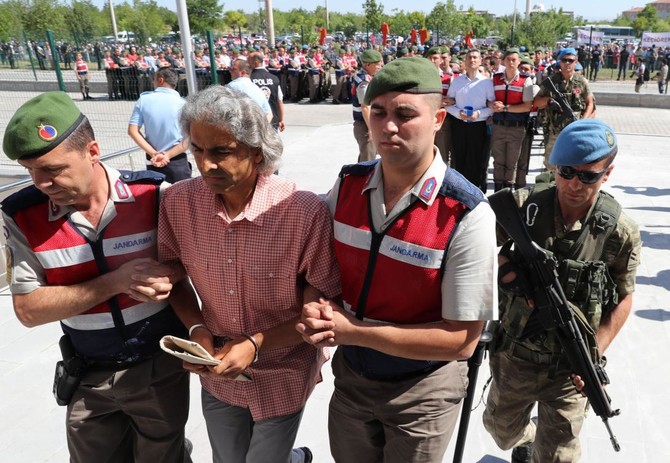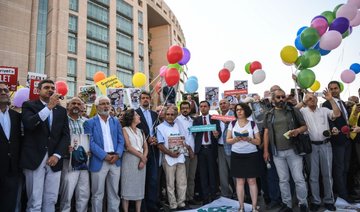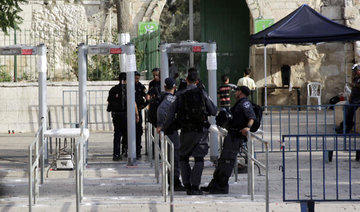TURKEY: Nearly 500 people appeared in court Tuesday in the biggest trial yet of suspects from Turkey’s failed coup, facing charges of conspiring to oust the government from an air base seen as the plotters’ hub.
Forty-one of those held were marched into the court outside Ankara one-by-one in a long line in front of television cameras and the public, with each suspect held by two members of the Turkish gendarmerie and flanked by an armed soldier.
People chanted “we want the death penalty!” and some threw nooses toward the suspects. The death penalty has been abolished in Turkey since 2004.
There were also chants of “martyrs don’t die, the nation won’t be divided.” Some people threw water bottles, an AFP reporter said.
Nazan Aytop, who came to court to make sure the blood of the 249 victims of the coup “was not given in vain” said she hoped the “accused will be given the sentence they deserve.”
A total of 486 suspects have been indicted in the case and almost all — a total of 461 — are held in custody while seven are still on the run and the remainder charged but not in jail.
During the tense opening hearing, veterans and relatives of those killed on the night of the coup bid booed the suspects’ lawyers, Dogan news agency reported.
Some lawyers hit tables to protest the “physical intervention” by some of the victims’ families as they walked past them, the agency said.
The suspects are accused of running the coup bid from the Akinci air base northwest of the capital, which the authorities regard as the headquarters of the plotters where orders were sent out for fighter jets to bomb parliament.
They are charged with crimes ranging from murder, violating the constitution and attempting to kill President Recep Tayyip Erdogan.
If convicted, they face life imprisonment.
Among the main suspects named in the indictment but still on the run is US-based Muslim cleric Fethullah Gulen, who is accused of ordering the attempted July 15, 2016 putsch.
Gulen, who is based in a secluded compound in the US state of Pennsylvania, strongly denies the charges.
Those held in custody include former air force chief Akin Ozturk who, like several suspects, is also on trial in another case related to the coup bid.
Another chief suspect is theology lecturer Adil Oksuz, whom Turkish officials accuse of being the so-called “imam” of the plot by coordinating the action on the ground in Turkey with Gulen.
Businessman Kemal Batmaz is meanwhile accused of assisting Oksuz.
Oksuz was detained following the coup’s defeat, but was subsequently released and is now on the run. Batmaz is in custody in Sincan prison outside Ankara.
Batmaz led the line of suspects into court wearing a cream shirt with black trousers followed by Ozturk wearing a grey shirt and black trousers.
Chief of Staff General Hulusi Akar and other senior commanders were held hostage at the base during the coup attempt before they were freed on the morning on July 16.
The base was seen as the coup bid headquarters where commands were given for the F-16 fighter jets to attack and fly them above the capital.
The Turkish parliament was bombed three times by F-16s.
The trial is taking place in Turkey’s largest courtroom established inside a prison complex in Sincan to hear coup-related trials and has space for 1,558 people.
The courtroom has previously hosted mass trials related to the coup bid including one which opened in February of 330 suspects accused of murder or attempted murder.
And in May, 221 suspects were put on trial accused of being the ringleaders of the failed coup.
The attempted coup left 249 people dead, the Turkish presidency says, not including 24 coup-plotters killed on the night.
There was heavy security including 1,130 security personnel inside and outside the courtroom, according to state-run news agency Anadolu, as well as snipers, armored security vehicles and a drone.
The trial is one of several held across Turkey judging coup suspects, in the largest legal process in the country’s modern history.
Over 50,000 people have been arrested over alleged links to Gulen in a wide-scale crackdown under the state of emergency imposed following the coup.
Almost 500 suspects on trial in Turkey’s biggest coup case
Almost 500 suspects on trial in Turkey’s biggest coup case

Jordan says 18,000 Syrians returned home since Assad’s fall

Interior Minister Mazen Al-Faraya told state TV channel Al-Mamlaka that “around 18,000 Syrians have returned to their country between the fall of the regime of Bashar Assad on December 8, 2024 until Thursday.”
He said the returnees included 2,300 refugees registered with the United Nations.
Amman says it has hosted about 1.3 million Syrians who fled their country since civil war broke out in 2011, with 650,000 formally registered with the United Nations.
Lebanon hopes for neighborly relations in first message to new Syria government

- Lebanon’s Iran-backed Hezbollah played a major part propping up Syria’s ousted President Bashar Assad through years of war
- Syria’s new Islamist de-facto leader Ahmed Al-Sharaa is seeking to establish relations with Arab and Western leaders
DUBAI: Lebanon said on Thursday it was looking forward to having the best neighborly relations with Syria, in its first official message to the new administration in Damascus.
Lebanese Foreign Minister Abdallah Bou Habib passed the message to his Syrian counterpart, Asaad Hassan Al-Shibani, in a phone call, the Lebanese Foreign Ministry said on X.
Lebanon’s Iran-backed Hezbollah played a major part propping up Syria’s ousted President Bashar Assad through years of war, before bringing its fighters back to Lebanon over the last year to fight in a bruising war with Israel – a redeployment which weakened Syrian government lines.
Under Assad, Hezbollah used Syria to bring in weapons and other military equipment from Iran, through Iraq and Syria and into Lebanon. But on Dec. 6, anti-Assad fighters seized the border with Iraq and cut off that route, and two days later, Islamist militants captured the capital Damascus.
Syria’s new Islamist de-facto leader Ahmed Al-Sharaa is seeking to establish relations with Arab and Western leaders after toppling Assad.
Iraqi intelligence chief discusses border security with new Syrian administration

BAGHDAD: An Iraqi delegation met with Syria’s new rulers in Damascus on Thursday, an Iraqi government spokesman said, the latest diplomatic outreach more than two weeks after the fall of Bashar Assad’s rule.
The delegation, led by Iraqi intelligence chief Hamid Al-Shatri, “met with the new Syrian administration,” government spokesman Bassem Al-Awadi told state media, adding that the parties discussed “the developments in the Syrian arena, and security and stability needs on the two countries’ shared border.”
Israeli minister’s Al-Aqsa mosque visit sparks condemnation

- Ben Gvir has repeatedly defied the Israeli government’s longstanding ban on Jewish prayer at the site in Israeli-annexed east Jerusalem
JERUSALEM: Israel’s National Security Minister Itamar Ben Gvir visited Jerusalem’s Al-Aqsa mosque compound on Thursday, triggering angry reactions from the Palestinian Authority and Jordan accusing the far-right politician of a deliberate provocation.
Ben Gvir has repeatedly defied the Israeli government’s longstanding ban on Jewish prayer at the site in Israeli-annexed east Jerusalem, which is revered by both Muslims and Jews and has been a focal point of tensions in the Israeli-Palestinian conflict.
“I went up to the site of our temple this morning to pray for the peace of our soldiers, the swift return of all hostages and a total victory, God willing,” Ben Gvir said in a message on social media platform X, referring to the Gaza war and the dozens of Israeli captives held in the Palestinian territory.
He also posted a photo of himself on the holy site, with members of the Israeli security forces and the famed golden Dome of the Rock in the background.
The Al-Aqsa compound in Jerusalem’s Old City is Islam’s third-holiest site and a symbol of Palestinian national identity.
Known to Jews as the Temple Mount, it is also Judaism’s holiest place, revered as the site of the second temple destroyed by the Romans in 70 AD.
Under the status quo maintained by Israel, which has occupied east Jerusalem and its Old City since 1967, Jews and other non-Muslims are allowed to visit the compound during specified hours, but they are not permitted to pray there or display religious symbols.
Palestinians claim east Jerusalem as their future capital, while Israeli leaders have insisted that the entire city is their “undivided” capital.
The Palestinian Authority’s foreign ministry said in a statement that it “condemns” Ben Gvir’s latest visit, calling his prayer at the site a “provocation to millions of Palestinians and Muslims.”
Jordan, which administers the mosque compound, similarly condemned what its foreign ministry called Ben Gvir’s “provocative and unacceptable” actions.
The ministry’s statement decried a “violation of the historical and legal status quo.”
The office of Israeli Prime Minister Benjamin Netanyahu said in a brief statement that “the status quo on the Temple Mount has not changed.”
UN force sounds alarm over Israeli ‘destruction’ in south Lebanon

- Under the ceasefire agreement, UNIFIL peacekeepers and the Lebanese army were to redeploy in south Lebanon, near the Israeli border, as Israeli forces withdrew over 60 days
BEIRUT: The United Nations’ peacekeeping force in Lebanon expressed concern on Thursday at the “continuing” damage done by Israeli forces in the country’s south despite a ceasefire in the war with Hezbollah.
The truce went into effect on November 27, about two months after Israel stepped up its bombing campaign and later sent troops into Lebanon following nearly a year of exchanges of cross-border fire initiated by Hezbollah over the war in Gaza.
The warring sides have since traded accusations of violating the truce.
Under the ceasefire agreement, UNIFIL peacekeepers and the Lebanese army were to redeploy in south Lebanon, near the Israeli border, as Israeli forces withdrew over 60 days.
UNIFIL said in a statement on Thursday that “there is concern at continuing destruction by the IDF (army) in residential areas, agricultural land and road networks in south Lebanon.”
The statement added that “this is in violation of Resolution 1701,” which was adopted by the UN Security Council and ended the last Israel-Hezbollah war of 2006.
The UN force also reiterated its call for “the timely withdrawal” of Israeli troops from Lebanon, and “the full implementation of Resolution 1701.”
The resolution states that Lebanese troops and UN peacekeepers should be the only forces in south Lebanon, where Hezbollah exerts control, and also calls for Israeli troops to withdraw from Lebanese territory.
“Any actions that risk the fragile cessation of hostilities must cease,” UNIFIL said.
On Monday the force had urged “accelerated progress” in the Israeli military’s withdrawal.
Lebanon’s official National News Agency (NNA) reported on Thursday “extensive” operations by Israeli forces in the south.
It said residents of Qantara fled to a nearby village “following an incursion by Israeli enemy forces into their town.”
On Wednesday the NNA said Israeli aircraft struck the eastern Baalbek region, far from the border.


















